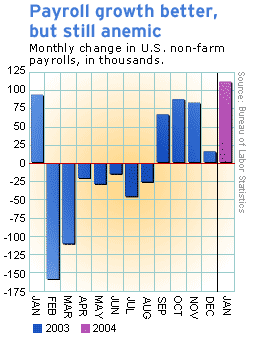NEW YORK (CNN/Money) -
Businesses made more merger deals in February than any time since the bubble days of 2000, a tracking group said Tuesday -- good news for bankers and the economy in the long run, but bad news for workers in the short run.
The dollar value of mergers and acquisitions (M&A) worldwide hit $238.6 billion in February, the highest total since $286.3 billion in October 2000, banking industry research group Dealogic said.
Meanwhile, private equity investment -- the seed money that helped fuel the Internet boom -- could be on the road to a comeback this year as well, according to a research note last month by Merrill Lynch economists Jose Rasco and Ron Wexler.

This kind of activity is good news for the broader economy. It's a sign that businesses are thinking about the future, getting more aggressive and opening their checkbooks. In addition to buying each other, they could buy new equipment and maybe hire new workers.
But in the short run, it could also mean that the job market could stay anemic for a while, according to Rasco and Wexler.
"The pickup in merger activity will clearly lead to further corporate restructuring, resulting in rounds of mass layoffs, as companies look to eliminate redundancies," the economists wrote. "This should have the effect of dampening employment gains in the months to come."
One example came late Monday when Gateway (GTW: Research, Estimates)'s CFO said the California-based computer maker was likely to cut about 2,000 jobs after its $235 million merger with eMachines Inc. is completed.
John Challenger, CEO of Challenger, Gray & Christmas, said some of February's 77,250 announced job cuts were due to merger activity -- though he wasn't sure how many, exactly.
| Related stories
|

|
|
|
|
"With M&A activity up, we're seeing more condensing of things like duplicate headquarters, banks on adjacent corners, duplicate warehouses," said Challenger, whose firm tracks job-cut announcements. "It's definitely something that's going to fuel more downsizing in 2004."
That's not exactly welcome news for a labor market that's yet to recover from its longest slump since World War II. Payrolls are still 2.3 million jobs lower than they were in March 2001, when the last recession began, and about 700,000 jobs lower than in November 2001, when that recession ended.
Sluggish economic growth, coupled with a fervor for cost-cutting among corporate leaders, have conspired to keep job growth weaker than in most recoveries, most economists believe.
Most of that cost-cutting has been driven by productivity gains, as companies have used technology and other means to improve efficiencies -- behavior that M&A activity often encourages.
"With M&A activity picking up, productivity growth will stay robust, and that means continued new efficiencies, and a lot of that will overshadow new job creation," said Lara Rhame, senior economist with Brown Brothers Harriman.
The hope among many economists is that the positives of M&A activity will outweigh the potential negatives, minimizing the labor market's pain.
While mergers and acquisitions can lead to layoffs, they also take time to complete. If increased M&A activity is a sign of increased business confidence, then it could foster a healthier job market, one that may be able to accommodate those people who are laid off when the merger is finally completed.
"When you have M&A activity, strategic decisions are being made, and that's a development that only occurs when people are very confident and looking towards the future," said Drew Matus, senior economist at Lehman Brothers. "That will help the economy, and we will have hiring."
The broader economic benefit of a merger or acquisition could depend on the companies involved and their reasons for consolidating, according to David Kelly, managing director and economic advisor at Putnam Investments. In other words, some mergers make more economic sense than others.
"For example, we have all of these wireless carriers with overlapping systems, and that's clearly inefficient," Kelly said. "Our living standards go up when we eliminate such inefficiencies."
Given the long slump in M&A activity that accompanied the recent stock-market slump, consolidation in such industries is probably long overdue, Kelly said.
But if stocks get overpriced, the chances of unnecessary or overly expensive M&A activity rises, potentially hurting shareholders and the economy.
"Sometimes at the top of the market, it's really just about people trying to make 2+2 equal 5," Kelly said. "A lot of the biggest mergers conducted in the most optimistic circumstances don't enhance shareholder value that much. We don't want to see a repeat of that."

|

